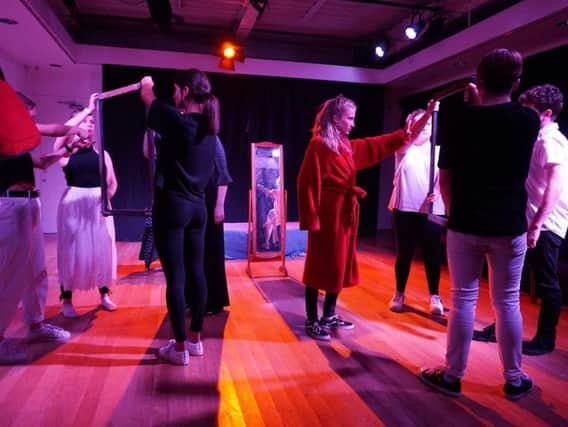Review: Poetic exploration of life with dementia on Warwick stage


“The man who can catch flies with chopsticks can accomplish anything.” So says Mr Miyagi in the 1984 film Karate Kid. Playbox’s new experimental work in progress might have nothing to do with karate, but its title and the quote, cited in the play, reflects the difficulty of catching a train of thought if one has dementia.
Catching Flies features nine members of the Ustinov Theatre School, a free drama school set up as a partnership between the Sir Peter Ustinov Foundation and Playbox Theatre, and which has provided free part-time training for students aged 15-18 since 2015. Sadly, this production is billed as the last by the School, which is a pity, because it has produced some marvellous work in the past. Their production of Bryony Lavery’s play, Stockholm, is simply one of the best plays I have ever seen, period.
Advertisement
Hide AdAdvertisement
Hide AdIt’s hard to categorise Catching Flies, and to try to do so is to miss the point. It’s less a play than a performance, a performance of what it might be like to have advanced dementia when one lives almost entirely in one’s own mind, where the images come in fragments that have no logical sequence but somehow seem desperately to strive to connect with a life lived and imagined.
The subject of dementia has featured in a number of plays as theatre companies attempt to confront this most serious of social issues, one which, according to The Alzheimer’s Society, currently affects one in six of us over the age of 80. The difficulty in representing it is to make it make sense when it doesn’t, not to the person with the illness.
Catching Flies doesn’t try; which is not to say that the scenes are merely random impressions. There are threads that run through the performance, such as the woman in red who is the person with dementia who appears in a number of scenes. There is the image of a mirror in which the subject and its reflection confront each other with affection and with aggression. Many of the scenes are dance-like, in which figures move like frantic phantoms urgently trying to make connections that are not quite sustained.
Catching Flies seeks to represent what cannot perhaps be fully represented. It’s a deeply humane piece, wittily performed and with a strange poetic beauty all its own. It’s still in development and I can’t wait to see how it turns out.